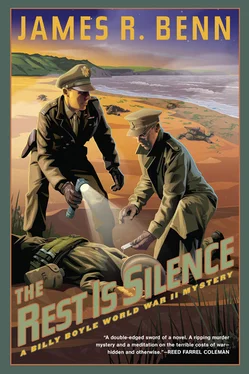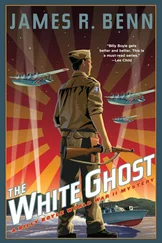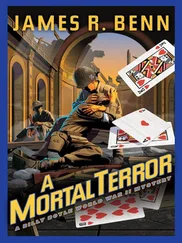James Benn - The Rest Is Silence
Здесь есть возможность читать онлайн «James Benn - The Rest Is Silence» весь текст электронной книги совершенно бесплатно (целиком полную версию без сокращений). В некоторых случаях можно слушать аудио, скачать через торрент в формате fb2 и присутствует краткое содержание. Год выпуска: 2014, ISBN: 2014, Издательство: Random House Publisher Services, Жанр: Шпионский детектив, на английском языке. Описание произведения, (предисловие) а так же отзывы посетителей доступны на портале библиотеки ЛибКат.
- Название:The Rest Is Silence
- Автор:
- Издательство:Random House Publisher Services
- Жанр:
- Год:2014
- ISBN:978-1-61695-267-9
- Рейтинг книги:3 / 5. Голосов: 1
-
Избранное:Добавить в избранное
- Отзывы:
-
Ваша оценка:
- 60
- 1
- 2
- 3
- 4
- 5
The Rest Is Silence: краткое содержание, описание и аннотация
Предлагаем к чтению аннотацию, описание, краткое содержание или предисловие (зависит от того, что написал сам автор книги «The Rest Is Silence»). Если вы не нашли необходимую информацию о книге — напишите в комментариях, мы постараемся отыскать её.
The Rest Is Silence — читать онлайн бесплатно полную книгу (весь текст) целиком
Ниже представлен текст книги, разбитый по страницам. Система сохранения места последней прочитанной страницы, позволяет с удобством читать онлайн бесплатно книгу «The Rest Is Silence», без необходимости каждый раз заново искать на чём Вы остановились. Поставьте закладку, и сможете в любой момент перейти на страницу, на которой закончили чтение.
Интервал:
Закладка:
“Right,” Tom said. “It wasn’t in his room at Greenway House. Perhaps you should check the bedroom he used at Ashcroft.”
There was a lot to check up on at Ashcroft House, now that a potential heir had turned up dead. I was suddenly much more interested in attending Sir Rupert’s funeral. Yesterday going was a courtesy. But tomorrow’s burial would now be a duty.
CHAPTER TWENTY-NINE
The small stones of Slapton Sands slid out from under my boots as breaking waves clawed at them, drawing the smooth, glistening pebbles back into the Channel with a rocky clatter. Two Higgins boats were making their way to shore, where idling trucks and bored GIs waited. Out in the Channel, vessels cut through the waves in all directions, the search for floaters still in full swing. The wind stung my face, the air cold and damp under darkening clouds.
We’d driven from Brixham and found no sign of Kaz and Big Mike here. Maybe their search was over and they’d headed back to Greenway House. If we didn’t find them soon, I’d try to raise them on the radio again. For the moment, I was content to watch the boats come in as I thought about what to do next. It all depended on what Harding thought was more important: the dead BIGOT who wasn’t supposed to be there, or a full body count of those who were.
“Look over there,” Tom said, pointing to a pile of debris above the high-tide mark. Life belts, packs, and a few helmets lay in a heap. Evidence that bodies had recently been collected.
“I wonder if Big Mike and Kaz have been here already,” I said.
“Maybe they went out on those Higgins boats,” Tom said. “They’d be good for a slow search.”
“Kaz? Never. He gets seasick, and he hates to admit it,” I said, launching into my impression of Kaz’s precise Polish-accented English. “ I do not like boats .” We both laughed.
Until the Higgins boats hit the shingle, their engines revving, and their bow ramps dropped.
They were filled with the dead.
They hadn’t been searching as much as collecting.
“Christ,” Tom said, the curse hissing through clenched teeth. “Will it never end?”
No, not for a good long time , I thought, but I didn’t say it. This pile of corpses was only a small down payment. When the Higgins boats went in under fire and the ramps went down, German machine gunners could have a field day, their deadly twenty-five-rounds-per-second MG-42s filling a single Higgins boat with enough hot lead to wipe out a platoon in the time it took to draw your last breath. It would look much like this, but with blood, not water, drenching the uniforms.
I shook the vision off. There was too much at stake for the D-Day planners to have left that to chance. Wherever they hit the beach, concrete emplacements and bunkers would have to have been obliterated by bombers, fighters, battleships, and rocket boats. We had the firepower, and there was no reason in the world not to use every shell, rocket, and bomb stashed in ammo dumps across southern England. I kept telling myself that, but I still had to look away, as if I were scanning the strand for Kaz and Big Mike, blinking against the wind. I could almost hear the MG-42, the machine gun the Germans gleefully called the Bonesaw. With good reason. It fired so fast that it was impossible to hear single bullets being fired. Some guys said the sound was like canvas being quickly ripped apart. All I knew was that it was a noise from the depths of Hell. But now, as I stood in front of corpses stacked three deep, there was only silence. Even the waves quieted, as if in deference to the dead. I felt dizzy and stepped back, fear rising in my gut as if the guns were here and it was happening right now. My face went hot, and I jumped when I felt a hand on me.
“Billy,” Tom said, shaking my arm. He was looking at me with a worried expression, and I realized he’d called my name several times. His voice sounded like a distant echo, but I heard him. The wind returned, as did the click clack of the stones rolling in the water. “We should check these men now.”
“Sure,” I said, unsure of where all the sounds had gone. I thrust my trembling hand into a jacket pocket. I’d seen the Bonesaw at work in Italy. Some days I didn’t think about it. Most nights I still dreamt about it. We walked closer to where sailors were carrying the dead off the Higgins boats to the waiting trucks. Men, Tom had called them. Respectful, but these were no longer men. They’d joined the ranks of the war dead, that long line of final sacrifice, before they’d even had a chance to storm that far shore.
“Read me the name, Billy,” Tom said, clipboard in one hand as he placed the other on my shoulder. It struck me as funny that Tom Quick, a man so haunted by his own loss and the losses he’d inflicted on others, was comforting me, leading me by the hand like a wayward child. I grinned, then laughed, and kept laughing until I got it under control, my sleeve pressed against my mouth. The situation was so bizarre that no one even took notice, or they pretended not to, at any rate.
“Okay,” I said, checking the dog tags of the lieutenant at my feet. “Greenberg, Phillip.” Tom shook his head. Not one of ours. I shuffled sideways, kneeling on the wet stones, pulling chains from officers’ necks. Finally we got a hit. Captain Roger Malcolm, from Pawtucket, Rhode Island. Almost a neighbor. Tom checked him off the list, the last of the officers from the landing craft. We followed the trucks as they drove off the strand once the bodies had all been loaded. Since this was a restricted area, there was no need to hide anything. The Casualty Clearing Station was off the road behind Slapton Ley, on a rise above the empty village of Torcross. The view was stunning, not that it mattered to most of the residents. The thatched roofs of Torcross were scattered on the hillside below us, beyond them the curve of the beach stretching out, the grey Channel on one side and the waters of Slapton Ley, rippled by the wind, on the other. Torcross held the only road off the landing area, and from here it was easy to see why they’d simulated an airborne drop behind the beach. If the enemy held that single road, everyone would be stuck in the landing area with nowhere to go but six feet under.
We turned our attention to the tents laid out in rows on the grassy field. Two long hospital tents faced three unmarked pyramidal tents, with a scattering of others beyond, probably a command post, judging by the antennas and jeeps, and a field kitchen, based on the woodsmoke and the odor of burnt Spam.
“Let’s have another go,” Tom said, then stopped as Big Mike and Kaz exited the tent nearest us.
“Billy, we’ve finished here,” Kaz said, waving as he spotted us. “We found the colonel and a lieutenant. How did you fare?”
“A captain and two lieutenants,” I said. “Well, three, actually. Peter Wiley is dead.”
“How did that happen?” Kaz said.
“Not entirely certain,” I said. “We found him with the bodies at Brixham.”
“I thought Sam ordered him to stay behind,” Big Mike said.
“He did,” I said. “Harding was damn clear about that. I don’t know how Peter managed it. I left a radio message for the colonel at Greenway House.”
“Ask him right now,” Big Mike said. “He’s grabbing some coffee in the mess tent. He got here about an hour ago to see what we’d come up with.” Thunder rumbled in the distance, and rain began to fall. To the northwest, I saw lightning crackle between thick grey clouds that were tumbling closer. A lot of the weather here rolled in from the northwest, swooping over the Channel before hitting France. I sent up a quick prayer to Saint Clare of Assisi, patron saint of good weather, to intercede when the invasion came, and to ease up on this bit of nasty weather while she was at it.
Читать дальшеИнтервал:
Закладка:
Похожие книги на «The Rest Is Silence»
Представляем Вашему вниманию похожие книги на «The Rest Is Silence» списком для выбора. Мы отобрали схожую по названию и смыслу литературу в надежде предоставить читателям больше вариантов отыскать новые, интересные, ещё непрочитанные произведения.
Обсуждение, отзывы о книге «The Rest Is Silence» и просто собственные мнения читателей. Оставьте ваши комментарии, напишите, что Вы думаете о произведении, его смысле или главных героях. Укажите что конкретно понравилось, а что нет, и почему Вы так считаете.












